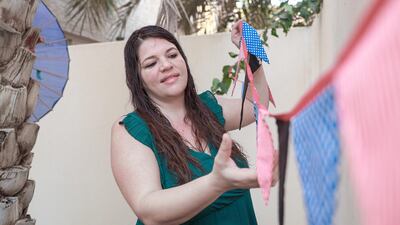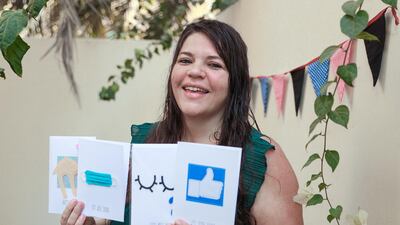Abu Dhabi mothers say a new affordable freelance visa empows them to legally establish start-up businesses and work flexibly on their own terms.
Late last year, the capital announced it would issue licences for 48 business categories, including fashion design, flower arrangement, legal consultancy, property and handicrafts.
The visas cost Dh530 ($144), enabling people such as Kate Carter, 37, to cheaply set up a company. In Ms Carter's case, Fabric Kate.
The mother of three makes crayons, personalised cards and cotton bunting for birthday parties and other events.
As well as selling them online under the licence of a third party site, Ms Carter would take her wares to markets.
“When I read the article about the new licence, I thought, yes, why not?” she said.
Ms Carter is from the UK and has lived in Abu Dhabi for the past 11 years.
“It was pretty straightforward. It’s perfect for me because I don’t have a lot of money to put into it. It took me about a week in total. This is for two years.”
If it becomes too expensive in future, Ms Carter said she may have to reassess, but for now it is working well because it is affordable. The licence enables her to sell her goods from her own website.
She said there are several benefits, including being able to keep the profits herself, rather than share them with the company providing the licence.
“Also, because I can do it from my own website, it enables me to add more stuff, like the message option.”
The importance of flexible freelance work
Mother of three Ffion Carroll, 31, from the UK, used to sell her cards and festive crafts at markets, where she paid for the use of a table and operated under the licence of the business that ran the event.
“I would drive to Dubai to do the markets, because Dubai was still open during the pandemic,” she said.
“But this means I can now legally work from home and supply to businesses. I now supply to about six or seven businesses.
"The potential is endless for me now. I can do it from home.”
Justine Anderson, who owns Shaggy Hands, which sells wall hangings, took out a handicraft licence.
She said having the ability to work for herself is important, because her husband is a pilot and away a lot. This way she still can work and be with her two children.
She said she was surprised at how easy the process was to apply.
“I thought it would be harder,” she said.
Almost put off by the need to attest her certificates, Ms Anderson was told they were not required for the handicraft licence, only for licences that require professional qualifications, such as architecture.
The new documentation will help her to grow her business – she used to sell her wall hangings through word of mouth only. She is currently building a website.
"I made a comment on Facebook about the licence because I had a question and a few people replied to ask how easy was it?" she said.
“I was able to tell them it was simple. There are a lot of people looking for a side hustle, I guess.”
The new freelance licences for the first time allow entrepreneurs working in a wide range of industries to set up a business and work from home or any authorised location.
People who are retired, homemakers, and students can also apply.
Freelance visas were previously limited to certain sectors, including media, finance and education.




